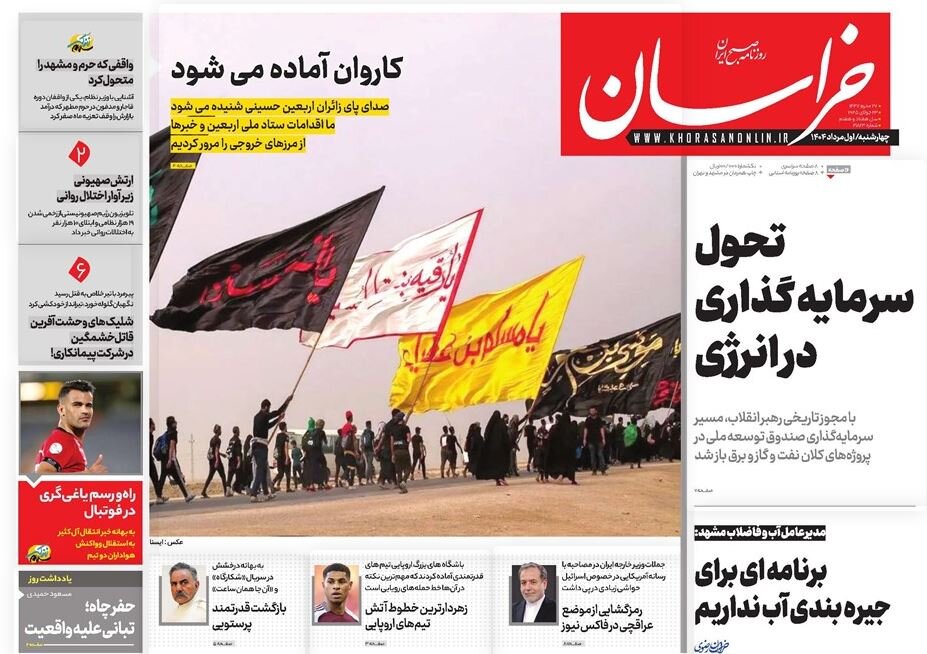Roadmap for negotiations with Europe

TEHRAN - On the eve of the start of Iran’s negotiations with the European side in Istanbul, Khorasan wrote: The upcoming meeting between Iran and three European countries in Istanbul is more than a routine diplomatic event.
What distinguishes this round of negotiations from previous ones is Europe’s unprecedented convergence with the United States and Israel after the recent 12-day war. Europe is no longer a mediator, nor a balanced and reliable partner, but rather the third side of a triangle of pressure along with Washington and Tel Aviv. Europe currently has no new tools to apply more pressure on Iran. What they are talking about under the name of the snapback mechanism is more of a psychological threat to create fear and gain concessions than a real and implementable threat. In these circumstances, Iran should not show any sign of retreat or flexibility on technical nuclear issues without receiving specific concessions. A deal in which Iran is only asked to make technical concessions, without having any practical and real achievements for the people, is practically playing on the opponent’s ground.
Etemad: Resolving the country’s problems requires dialogue with all political factions
In a report published on Wednesday, Etemad quoted President Masoud Pezeshkian who said in a meeting on Tuesday that resolving the problems the country is facing entails dialogue with those opposition groups who are at odds with the Islamic Republic. The president said the government is ready to engage constructively with all political currents, stating: “Today, we are even prepared to hold dialogue with the opposition on the basis of fairness and justice, because solving the country’s problems requires dialogue—not confrontation.” In a meeting with members of the Iranian Reform Front, Pezeshkian noted: “The path of reforms is a complex one. Some statements may seem easy and simple in words, but implementing them in practice is far more difficult. Reform is a time-consuming process, and some changes might take up to a decade.” The president described the government’s direction as a continuous effort to achieve its set goals, clarifying: “We are on a path defined by specific objectives and based on public trust, and we are striving to fulfill them.” Pezeshkian expressed gratitude for the Iranian nation’s wise behavior during critical moments, adding: “People’s performance during the 12-day war (referring to Israel’s war on Iran from June 13-June 24) was based on engagement, not confrontation—and this social capital doubles the government’s responsibility to pursue public demands.”
Kayhan: Power, the only guarantor of security
Kayhan devoted its editorial to Iran's bargaining chip against the enemy and wrote: We are now at war, and only its form has changed after the ceasefire. We did not start this war. This war was imposed on dear Iran, and in the middle of the negotiations. This means that they were not looking for negotiations; they were looking to turn Iran into another Syria or Libya, but they failed. There are other signs besides these statements that show that their view of negotiations is completely different from ours. Before the war, when news broke out that in the five rounds of indirect negotiations between Iran and the United States, the American side was not serious at all and that the statements made during the meetings were different from the positions taken after the meetings, it meant that they were not looking for negotiations, but were planning to attack our country. Their definite goal was to divide Iran. They pursued this goal in two ways: 1- military aggression, 2- negotiations! They failed in the military aggression. Now they are pursuing the same goal through negotiations.
Jam-e-Jam: Goals of Iran-troika negotiations
Two basic goals were pursued in the nuclear negotiations with the West: lifting sanctions and preventing war. After the actions of the Zionist regime and the United States, it was practically shown that the logic of dialogue and diplomacy has no place in resolving the disputes between Iran and the United States. Of course, before the war, negotiations with the Europeans to resolve the nuclear issue were proceeding well, but with the aggressive actions of the Zionist regime and the United States, there is no longer much hope for rational behavior in Europe. The snapback mechanism has two faces: a legal and a political one. Europe has shown that it does not care about the legal approach and is seeking psychological warfare and putting pressure on Iran. Iran has numerous deterrent tools, such as withdrawing from the NPT, increasing the percentage of enriched uranium, and control and dominance over the Strait of Hormuz. Therefore, if the Europeans insist on their unprincipled moves, they must be prepared to face a serious challenge regarding cheap energy supply. Europe, that its economy has stagnated under the burden of the proxy war with Russia and Trump's tariffs, must pay the price for its Zionist escalation with Iran.
Leave a Comment